
Albany Leon "Barney" Bigard was an American jazz clarinetist known for his 15-year tenure with Duke Ellington. He also played tenor saxophone.
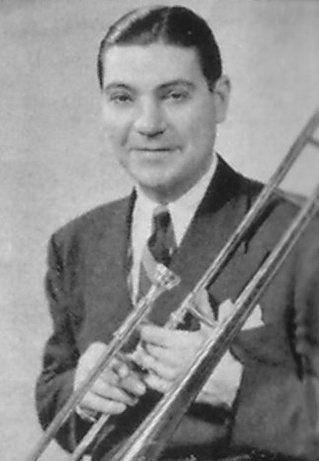
Weldon Leo "Jack" Teagarden was an American jazz trombonist and singer. According to critic Scott Yanow of Allmusic, Teagarden was the preeminent American jazz trombone player before the bebop era of the 1940s and "one of the best jazz singers too". Teagarden's early career was as a sideman with the likes of Paul Whiteman and lifelong friend Louis Armstrong.

Boniface Ferdinand Leonard "Buddy" DeFranco was an Italian-American jazz clarinetist. In addition to his work as a bandleader, DeFranco led the Glenn Miller Orchestra for almost a decade in the 1960s and 1970s.

The Dorsey Brothers were an American studio dance band, led by Tommy and Jimmy Dorsey. They started recording in 1928 for OKeh Records.

The Glenn Miller Story is a 1954 American biographical film about the eponymous American band-leader, directed by Anthony Mann and starring James Stewart in their second non-western collaboration.

James "Trummy" Young was an American trombonist in the swing era. He established himself as a star during his 12 years performing with Louis Armstrong in Armstrong's All Stars. He had one hit with his version of "Margie", which he played and sang with Jimmie Lunceford's orchestra in 1937. During his years with Armstrong, Young modified his playing to fit Armstrong's approach to jazz.
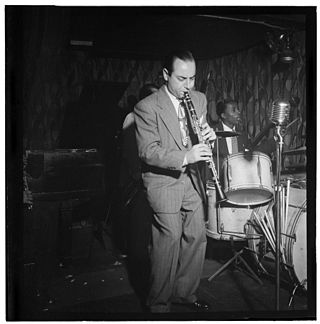
Michael Andrew "Peanuts" Hucko was an American big band musician. His primary instrument was the clarinet, but he sometimes played saxophone.
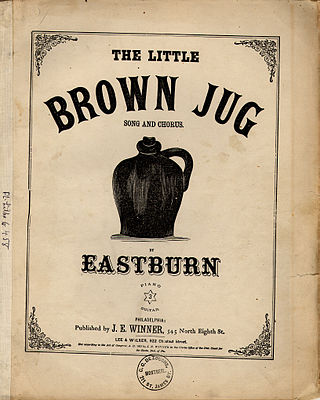
"Little Brown Jug" is a song written in 1869 by Joseph Eastburn Winner, originally published in Philadelphia with the author listed as Winner's middle name "Eastburn".
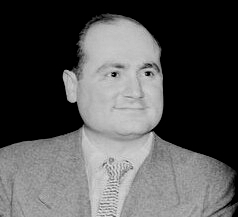
Jerry Gray was an American violinist, arranger, composer, and leader of swing dance orchestras bearing his name. He is widely known for his work with popular music during the Swing era. He worked with the bandleaders Artie Shaw and Glenn Miller.
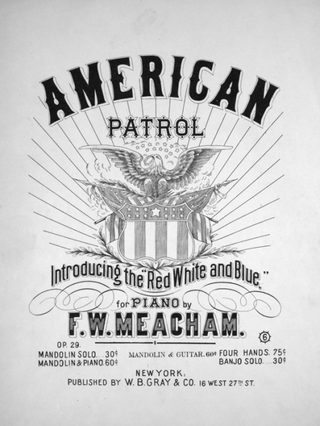
"American Patrol" is a popular march written by Frank White (F.W.) Meacham in 1885. It incorporates both original musical themes by Meacham and melodies from American patriotic songs of the era such as "Columbia, the Gem of the Ocean," "Dixie," and "Yankee Doodle." Composed for piano, it was then arranged for wind band and published by Carl Fischer in 1891. Copyright was assigned to Meacham's widow, Cora, in 1912 and renewed in 1919. The 1885 and 1914 printings for piano do not include "Dixie."
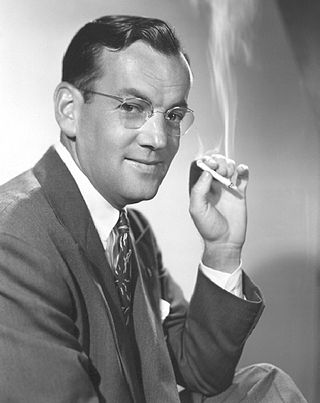
Between 1938 and 1944, Glenn Miller and His Orchestra released 266 singles on the monaural ten-inch shellac 78 rpm format. Their studio output comprised a variety of musical styles inside of the Swing genre, including ballads, band chants, dance instrumentals, novelty tracks, songs adapted from motion pictures, and, as the Second World War approached, patriotic music.
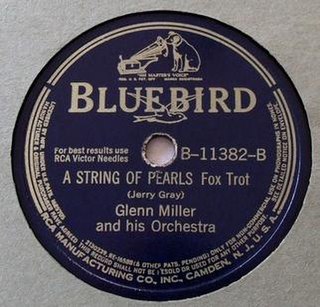
"A String of Pearls" is a 1941 song recorded by Glenn Miller and His Orchestra on RCA Bluebird that November, becoming a #1 hit. It was composed by Jerry Gray with lyrics by Eddie DeLange. The song is a big band and jazz standard.

"Doin' the Jive" is a 1938 song composed by Glenn Miller and pianist Chummy MacGregor. The song was released as a 78 single by Glenn Miller and His Orchestra on Brunswick.
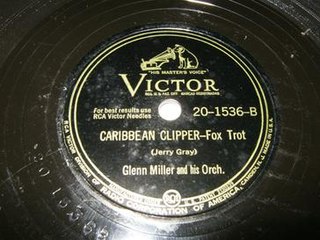
"Caribbean Clipper" is a big band and jump song recorded by Glenn Miller and his Orchestra in 1942. The song was composed by Jerry Gray with lyrics by Sammy Gallop. Recorded in 1942, the song was released as a Victor 78 single by Glenn Miller and His Orchestra in 1943 as the B side to "Blue Rain".

"Tomorrow's Another Day" is a 1935 song composed by Glenn Miller for the Dorsey Brothers Orchestra. The song was released as a 78 single by the Dorsey Brothers Orchestra on Decca Records.

"Harlem Chapel Chimes" is a 1935 jazz instrumental composed by Glenn Miller. The song was released as an A-side 78 single by the Dorsey Brothers Orchestra.

Glenn Miller Plays Selections From the Film "The Glenn Miller Story" is a 1954 compilation album by Glenn Miller and his Orchestra. The collection contained songs featured in the 1954 Universal-International film The Glenn Miller Story starring James Stewart and June Allyson. It was the first Glenn Miller album to be certified Gold in the U.S.

Pure Gold is a 1975 compilation album of 10 studio recordings by Glenn Miller and his Orchestra recorded between 1939 and 1942 by RCA Victor. The recordings were all originally issued as 78 RPM records on the RCA Bluebird and Victor labels and was certified Gold by the RIAA. The album was originally issued on LP and compact disc in reprocessed (fake) stereo sound; in 1988, RCA remastered the album in original monophonic sound for its second CD reissue. The album was also reissued on LP that year under a new catalog number (7648-1-R) and inexplicably omits two tracks, both of which appear on the reissued CD.
Joseph William Yukl was an American jazz trombonist.


















